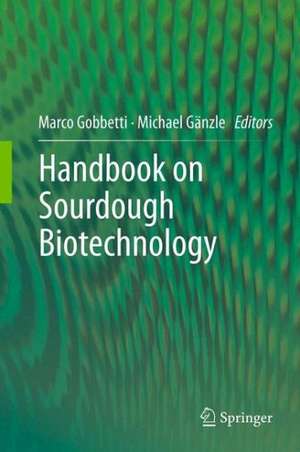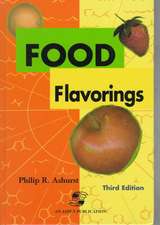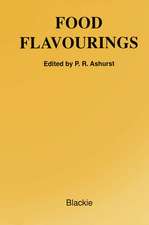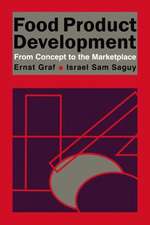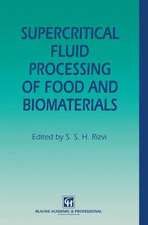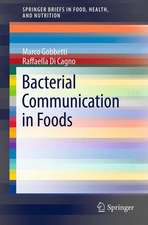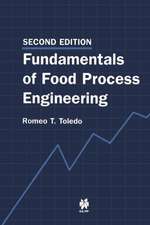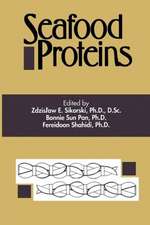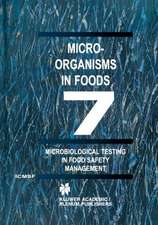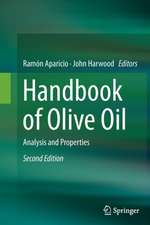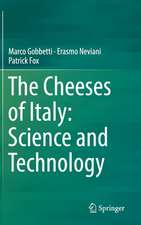Handbook on Sourdough Biotechnology
Editat de Marco Gobbetti, Michael Gänzleen Limba Engleză Hardback – 11 dec 2012
| Toate formatele și edițiile | Preț | Express |
|---|---|---|
| Paperback (1) | 833.25 lei 38-44 zile | |
| Springer International Publishing – 26 apr 2024 | 833.25 lei 38-44 zile | |
| Hardback (2) | 1295.05 lei 6-8 săpt. | |
| Springer Us – 11 dec 2012 | 1295.05 lei 6-8 săpt. | |
| Springer International Publishing – 25 apr 2023 | 1391.36 lei 6-8 săpt. |
Preț: 1295.05 lei
Preț vechi: 1579.33 lei
-18% Nou
Puncte Express: 1943
Preț estimativ în valută:
247.84€ • 269.11$ • 208.18£
247.84€ • 269.11$ • 208.18£
Carte tipărită la comandă
Livrare economică 22 aprilie-06 mai
Preluare comenzi: 021 569.72.76
Specificații
ISBN-13: 9781461454243
ISBN-10: 1461454247
Pagini: 304
Ilustrații: VI, 298 p.
Dimensiuni: 155 x 235 x 22 mm
Greutate: 5.8 kg
Ediția:2013
Editura: Springer Us
Colecția Springer
Locul publicării:New York, NY, United States
ISBN-10: 1461454247
Pagini: 304
Ilustrații: VI, 298 p.
Dimensiuni: 155 x 235 x 22 mm
Greutate: 5.8 kg
Ediția:2013
Editura: Springer Us
Colecția Springer
Locul publicării:New York, NY, United States
Public țintă
Professional/practitionerCuprins
1. Historical and Social Aspects of Sourdough.- 2. Chemistry of Cereal Grains.- 3. Technology of Baked Goods.- 4. Technology of Sourdough Fermentation and Sourdough Applications.- 5. Taxonomy and Biodiversity of Sourdough Yeasts and Lactic Acid Bacteria.- 6. Physiology and Biochemistry of Sourdough Yeasts.- 7. Physiology and Biochemistry of Lactic Acid Bacteria.- 8. Sourdough: A Tool to Improve Bread Structure.- 9. Nutritional Aspects of Cereal Fermentation with Lactic Acid Bacteria and Yeasts.- 10. Sourdough and Gluten-Free Products.- 11. Sourdough and Cereal Beverages.- 12. Perspectives.
Notă biografică
Marco Gobbetti is full professor of Food Microbiology at the Department of Biologia e Chimica Agro-Forestale ed Ambientale of the University of Bari Aldo Moro. He is author of around 320 articles, the majority of which have been published in international journals. Sourdough microbiology is one of the main topics of his research.
Michael Gänzle is full professor and Canada Research Chair in Food Microbiology and Probiotics at the Department of Agricultural, Food and Nutritional Science of the University of Alberta. The microbial ecology of cereal fermentations and the influence of fermentation on bread quality are a major focus of his research program.
Michael Gänzle is full professor and Canada Research Chair in Food Microbiology and Probiotics at the Department of Agricultural, Food and Nutritional Science of the University of Alberta. The microbial ecology of cereal fermentations and the influence of fermentation on bread quality are a major focus of his research program.
Textul de pe ultima copertă
Bread and leavened bakery products have been essential to human nourishment for millennia. Traditionally, bread production has relied on the use of sourdough as a leavening agent and to impart a characteristic quality to baked goods. In recent years, improved understanding of the biodiversity and microbial ecology of sourdough microbiota, the discovery of new species, and the commercialization of innovative products have vastly expanded the potential of sourdough fermentation for the production of baked goods. For example, raw materials such as cereals, pseudo-cereals, ancient grains, and gluten-free substrates, as well as a large number of baked good varieties (e.g., typical and industrial breads, sweet baked goods, gluten-free products) may benefit from advances in sourdough fermentation. In addition, biotechnological tools and culture properties have been discovered to improve both the shelf life and the sensory and textural qualities of baked goods, as well as their nutritional and health-promoting properties.
Though sourdough has been and will remain a unique fermentation process, this is the first book dedicated completely to sourdough biotechnology. It reviews the history of sourdough and the potential of sourdough fermentation in the production of bread and baked goods. A thorough discussion of the various processing steps includes the chemical properties of the raw matter, the taxonomy, diversity, and metabolic properties of starter yeasts and lactic acid bacteria, and the effects of sourdough fermentation on the shelf life and the sensory, textural, nutritional, and health-promoting properties of baked goods.
Though sourdough has been and will remain a unique fermentation process, this is the first book dedicated completely to sourdough biotechnology. It reviews the history of sourdough and the potential of sourdough fermentation in the production of bread and baked goods. A thorough discussion of the various processing steps includes the chemical properties of the raw matter, the taxonomy, diversity, and metabolic properties of starter yeasts and lactic acid bacteria, and the effects of sourdough fermentation on the shelf life and the sensory, textural, nutritional, and health-promoting properties of baked goods.
Caracteristici
First reference guide on sourdough biotechnology Highlights the microbiological, technological, nutritional, and chemical aspects of sourdough biotechnology The first book of its kind dedicated wholly to sourdough biotechnology Includes supplementary material: sn.pub/extras
